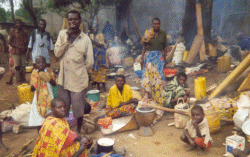|
During his nearly four years in power, Kabila regularly and ruthlessly violated the human rights of the Congolese people, killing, torturing, imprisoning, and causing the "disappearance" of any who he thought threatened him or his regime.
|
Kabila's Human Rights Legacy |
Kabila handed out rights to exploit the vast mineral riches of the country to his commercial and military cronies while the economy as a whole disintegrated and ordinary people lacked food, medicine, and other basic needs of life, particularly in Kinshasa and other urban areas.
Despite his abuses, Kabila held on to some support by portraying himself as a symbol of national resistance against the foreign forces that occupied eastern Congo. He profited from and his supporters encouraged hatred of the Tutsi, who were held responsible for the misconduct of the Rwandan army and its Congolese allies. He enjoyed the support of troops from his home region of Katanga, whom he in turn favored with regular pay and supplies. But other units, ordinarily left unpaid, preyed on citizens to support themselves.
With Kabila's death, a new government inherits a nation wracked by a war that has pulled in six neighboring nations and spawned three major rebel movements as well as numerous smaller armed opposition bands. International businessmen, many of them based outside the region, have milked the wealth of the Congo while their governments exert no effective pressure for peace. Only an end to hostilities, the interdiction of incursions into neighboring countries, and the withdrawal of foreign forces offers the possibility of averting worsening ethnic-based conflict, like that now flaring in the Rwandan-dominated region of South Kivu and in the Ugandan-dominated region of Ituri.
According to international humanitarian sources, more than 1.7 million Congolese have died as a result of the war. Kabila's death cannot guarantee an end to this carnage; that requires commitment by all belligerents as well as by the international community.
In addition, to move towards a state of law, the new government must:
- End all interference with basic human rights, as provided for by international and national law, including freedom of expression, freedom of the press, and freedom of assembly.
- Order a review of persons currently detained in prison and release those held without charge or credible suspicion of guilt
- Investigate and prosecute crimes against humanity as well as murders, "disappearances" and other acts of state terrorism against citizens
- Declare and enforce respect for all Congolese regardless of ethnic or regional origin
- End harassment of human rights groups and obstruction of human rights investigations
Kabila's death does not clear the record but rather creates the opportunity to insist on accountability for the crimes committed under his authority. In 1997 the U.N. Secretary-General sent a team to investigate war crimes committed by all parties during the first Congo war. Kabila blocked their work, but the investigators returned with enough information to conclude that combatants in the first Congo war had committed crimes against humanity and perhaps genocide. The Security Council asked the Congolese and Rwandan governments to continue the inquiry, but they did nothing. After the start of the second war, Kabila's government alleged that its former ally Rwanda was responsible for obstructing the U.N. investigation and pledged cooperation with future U.N. inquiries. The U.N. did nothing. The Security Council should now name a Commission of Experts to resume the earlier inquiry and also to examine subsequent alleged crimes against humanity committed by all belligerents in the Congo.
